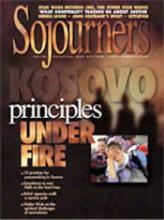Our television screens erupted this spring with images of streams of Kosovar Albanians fleeing across borders just ahead of Serbian troops, and office buildings in Belgrade going up in flames from NATO bombs. We have felt a deepening anguish over the bloodshed and human suffering.
We have been appalled by the atrocities of massacre and "ethnic cleansing" committed by Serbian troops in Kosovo. But we have also felt the suffering of Serbs as buses, trains, and residential neighborhoods have been destroyed by NATO war planes.
While the air attacks may have been a well-intentioned effort to stop the terror against Kosovar civilians, the bombing has been a strategic and moral failure. It has served only to increase the misery and death on all sides. The attempts to destroy the civilian infrastructure of bridges and power plants, and the use of anti-personnel cluster bombs against residential neighborhoods, cannot be morally justified. Rather than prevent the killing in Kosovo, it has served only to exacerbate it.
The history of the relationship between Serbia and Kosovo is a long and complicated one. It involves repressive Serb activities against ethnic Albanians, and it also involves terrorist activities by the Kosovo Liberation Army against Serbs in Kosovo. It involves the United States acting in such as way at the Dayton conference in 1995 that legitimized the Milosevic regimes control of Kosovo, and it also involves the West funding and arming the militant, undemocratic KLA. It involves the opposition to Milosevic by members of religious and other civil society sectors in Serbia, and it also involves the nonviolent efforts to create an alternative civil society in Kosovoboth of which were largely ignored by the United States.
Read the Full Article
